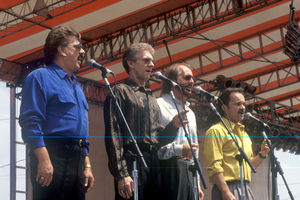
Harold Reid, Country Music Hall of Fame member, nine-time CMA Awards winner and bass vocalist in the legendary Country Music group the Statler Brothers, passed away Friday, April 24. He was 80.
"Harold and the Statler Brothers were a staple on many of the great CMA Awards shows throughout the 1970s," says Sarah Trahern, CMA Chief Executive Officer. "When I passed Harold backstage at TNN during a taping for their long-running television show, he always had a hello and a bright smile. When I heard of his passing on Friday, I immediately thought of his legendary bass vocals on so many era-defining Country and gospel classics."
With a winning combination of musical skills, showmanship, professionalism, and business acumen, the Statler Brothers built a career that lasted almost half a century. For more than 30 years, they maintained one of Country Music's top-grossing road shows, while enjoying great success as recording artists and television performers. All the while, they kept alive Country's venerable tradition of quartet singing, a tradition that reaches back to the genre's early roots in gospel music.
In the early 1960s, the group coalesced around the talents of four Virginians: Reid, Phil Balsley, Lew DeWitt and Harold's brother Don Reid. Harold Reid, DeWitt, Balsley and Joe McDorman had worked in a Staunton, VA, high school group called the Four Star Quartet, making their first appearance in 1955. By 1961, when Harold reorganized the act as the Kingsmen, Harold's younger brother, Don, had replaced McDorman. The act featured a variety of Country, pop and gospel material, but crafted their harmonies along the lines of influential gospel quartets such as the
Statesmen and the Blackwood Brothers. To avoid confusion with a popular North Carolina-based gospel group also named the Kingsmen, they changed their name to the Statler Brothers (after Statler Tissues).
The year 1964 marked a turning point for the four young men, as they joined Johnny Cash's road show. They would remain with Cash's troupe for more than eight years, and they were key members of Cash's ABC network television show from 1969 to 1971.
A Columbia Records hitmaker, Cash insisted that the label add the Statlers to its roster, and they made their first Columbia session in April 1964. In March 1965 they cut DeWitt's composition "Flowers on the Wall," a No. 2 Country hit that crossed over to No. 4 on the Hot 100 Chart, won a 1965 Grammy Award for Best Contemporary (R&R) Performance, Group (Vocal or Instrumental), and helped the quartet garner another 1965 Grammy for Best New Country & Western Artist. But with the exception of two Country top 10 singles in 1967, they struggled to follow up on this success at Columbia.
As recording artists, the Statlers hit their stride after Jerry Kennedy, head of Mercury's Country division, signed them in 1969. Throughout their long career with the label,
Kennedy produced their recordings, even after leaving to form his own production company in 1984. The group's first
Mercury single, "Bed of Rose's," became a top 10 Country hit in 1970-71. Eleven more top 10 records followed during the 1970s, many of them written by the Reid brothers. These included "Do You Remember These," "The Class of '57," "I'll Go to My Grave Loving You," and the group's first chart-topping hit, 1978's "Do You Know You Are My Sunshine." They snagged another Grammy for "The Class of '57" and won CMA Awards for Vocal Group of the Year six years running (1972-77) and again in 1979, 1980 and 1984, totaling nine CMA Awards wins.
The group's third
Mercury album, Country Music Then and Now, featured their comic alter egos "Lester 'Roadhog' Moran & The Cadillac Cowboys," who parodied a fourth-rate hillbilly band from the waning days of live radio. Their alter egos became so popular that an entire album followed, the hilarious Alive at the Johnny Mack Brown High School, released in 1974. Subsequently "the Old Road Hog" was retired, and according to the Statlers' last report, was "recovering from an autopsy."
Never in robust health, DeWitt contended with Crohn's disease, a disorder that sapped his energy and forced him to leave the group in 1982. He died August 15, 1990. His replacement, Jimmy Fortune, joined on a permanent basis the same year. Like DeWitt, Balsley, and the Reids, Fortune was also a Virginian. By now the Statlers were hitting on all cylinders, and during the 1980s they scored 18 more Top 10 singles, including three No. 1 hits penned by Fortune: "Elizabeth" (1983-84), "My Only Love" (1984-85) and "Too Much On My Heart" (1985). Fortune also wrote the group's final top 10 record, "More Than a Name On A Wall" (No. 6, 1989).
Though they recorded and did business in Nashville, the Statlers made Staunton their base of operations, and they continued to live there. In 1970, the group staged their first Happy Birthday U.S.A. Fourth of July concert, parade and community celebration. A top tourism draw, the event featured first-tier Country artists as guest performers. It continued through 1994, with proceeds going to local charities.
From 1991 to 1997, a top-rated Nashville Network television show widened the Statlers' fame as one of Country Music's most award-winning groups. This weekly Saturday night program resembled a typical 1950s variety show-a strategy the group deliberately pursued to reach a wide, often underserved audience. Although hit records eluded them, TV exposure supported their tours, and they consistently played to sellout crowds until they retired from the road in 2002.
Election to the Country Music Hall of Fame in 2008 was a well-deserved honor for one of American music's greatest success stories.
Comments
To post a comment, you must
register and
login.


